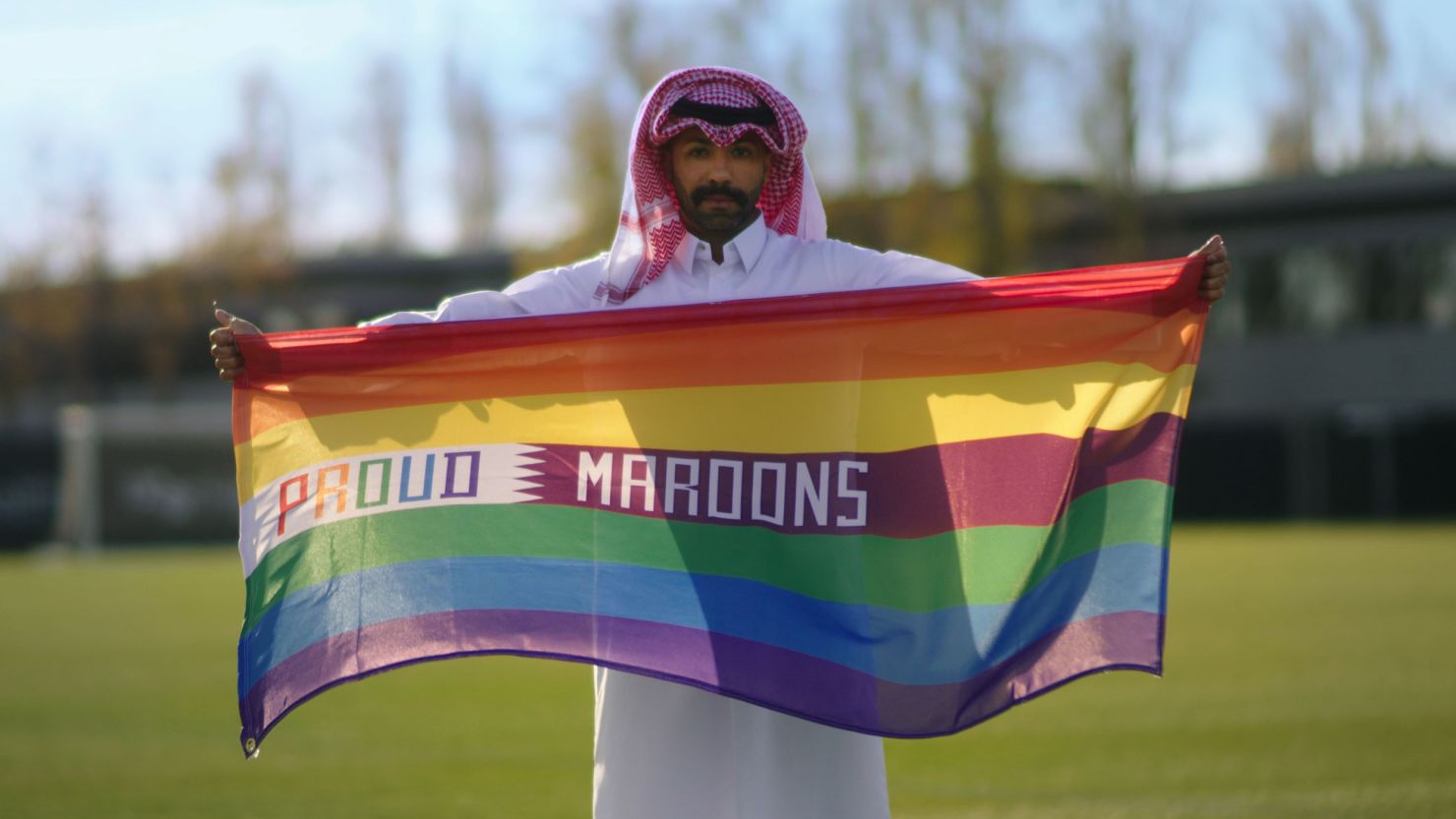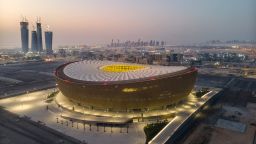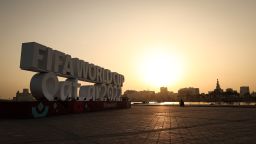In May of this year, Dr. Nasser “Nas” Mohamed appeared in The Independent and on the BBC, where he became what many called the first Qatari to come out publicly as gay. It was a calculated move by Mohamed to raise awareness about the existence – and mistreatment – of the LGBTQ community in Qatar in advance of the 2022 FIFA World Cup, which kicks off November 20.
This decision radically changed his life and amped-up his activism. But to understand what he’s fighting for, you must first know where he came from.
CNN Opinion spoke at length with Mohamed about his journey, his goals and his hopes for his native country. The interview has been edited for clarity.
Can you first share a bit about who you are, where you grew up and what your childhood looked like?
I’m a 35-year-old physician living in San Francisco, and I’m also an LGBTQ asylum seeker from Qatar.
I was born and raised in Qatar, in a rural area about an hour south of Doha, the capital. I grew up in a very conservative low to middle-income family. I only spoke Arabic until my teenage years. I wasn’t allowed to listen to music and didn’t have access to Western media. And I had no exposure to anything related to the LGBTQ community at all.
When I was a kid, about eight or nine, I heard family members say, “Oh my god, when you were three or four, we would ask you what you would want to be and who you would want to marry, and you would always tell us you would want to marry guys!” And then they laughed and laughed.
I didn’t remember ever saying that. What I do remember is starting to experience same-sex attraction when I was about 12, but I didn’t have the vocabulary for it at the time.
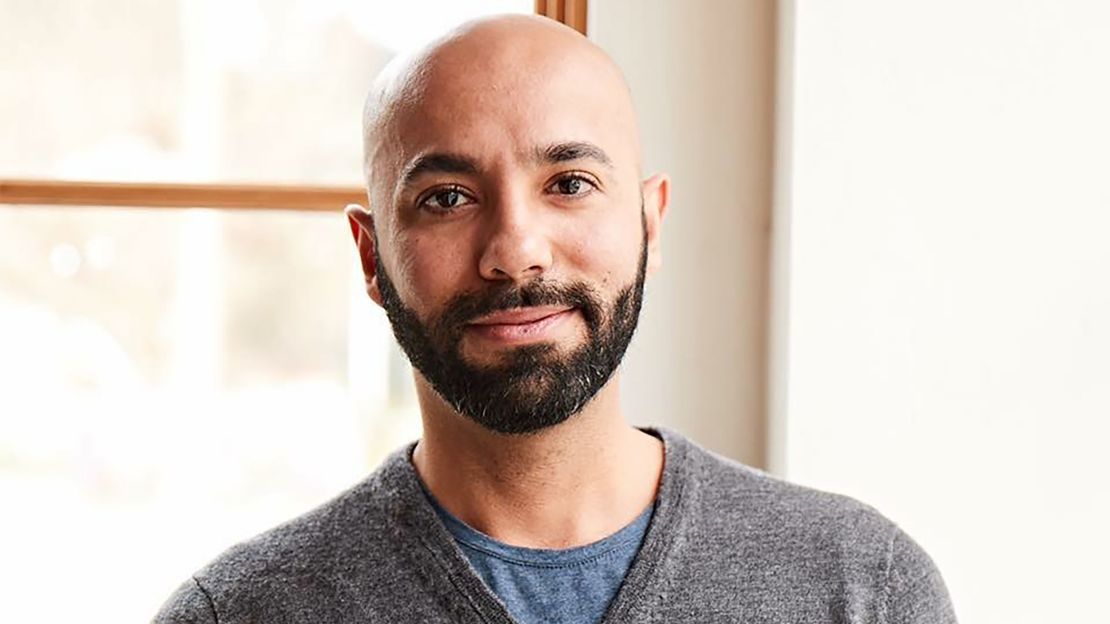
We don’t talk about sex where I grew up. It’s just something that happens when you get married, and a lot of people marry their spouse the first day they meet in an arranged setting.
I was very religious, and I wanted to go to medical school. I studied and prayed. That was basically all I did growing up.
In college, I was still avoidant. I didn’t process what I was feeling. I told my family I didn’t want to get married because I wanted to be a doctor and couldn’t start a family while in medical school. This was my way of pushing them off the subject.
Sexual relationships outside of marriage, including heterosexual ones, are illegal in Qatar according to Islamic teachings. Based on the interpretation of the law in Qatar, the way it is written, it technically allows punishment up to the death penalty for homosexual relationships between men, based on Sharia law. I knew I needed to follow what God said and not do anything.
When did you accept or fully understand that you were gay?
In high school, I began learning English. I attended Weill Cornell Medicine - Qatar, a medical school established by Cornell University and the Qatar Foundation. I was mostly based in Qatar, but I also spent time in New York, going back and forth for school.
My being gay sunk in, of all places, in Las Vegas. I was doing research as a medical student, and my research topic on trauma surgery was selected for a presentation in Vegas. I still dressed in traditional Qatari attire, but I bought some Western clothes to wear. They were awful. I didn’t know how to shop.
I was 22, very conservative, still a virgin and had never had a drink. I was walking through one of the casinos to get to my room and saw these men staring at a female go-go dancer. I didn’t want to look at her, but then I did – and I felt nothing. I thought to myself, “I must be a really good Muslim boy.”
And then, at that very moment, a guy walked by. He was really hot, bumped into my shoulder, and I was turned on immediately.
Still, I didn’t have a word for what I felt. Back in my room and on my computer, I began searching. I looked up same-sex attraction and saw the terms “gay” and “homosexual.” I began reading all about the topic and needed to know if I was gay. So, I found a gay club on the strip.
I had never been in a bar in my entire life and was really afraid. I was afraid because I didn’t know what to expect walking in. But I also was afraid that I’d be turned in to my government for doing this.
My only ID was my Qatari passport. I thought, “They will see this, tell somebody and that will be the end of me.” But I had to do this. When I showed my passport at the door, the bouncer just said, “Cool picture. Come in.”
This time the go-go dancer was male, and I was shocked. There were all these men around me, talking to each other. Everybody there was attracted to the same sex.
I turned around immediately, went back to my room and had a complete meltdown. It was a moment of crisis. I was in conflict with my religious beliefs, had just realized I was different, and I was afraid to go home.
You had to go home to finish medical school. So what happened next?
I got very depressed. It consumed me. There are all these pieces that come together to give us our sense of self, and I felt like one piece was at odds with everything else. I didn’t know what to do.
It was a hard couple of years. I eventually came out to a friend from medical school during our rotation in New York City. A straight Russian guy was the first person I came out to, and we’re still best friends.
I left Qatar to do my residency in the United States. I needed more time away. When I left, I got my first tattoo on my side. It’s Arabic text and says, “I pleased others with a life that led to my demise. Now it’s time for others to see me born victorious.”
And that’s really how I felt toward the end of my time in Qatar. Trying to fit in where I grew up was costing me my sense of self. I had to leave to be me.
At what point did you seek asylum?
I went to Connecticut to do my residency and lived there for three years. During that time, I cut ties with everyone in Qatar, except my family, and stopped speaking Arabic completely. I was out from day one and was living a double life. People from my old life just didn’t know, and people that met me in the US only knew me as me.
Next, I did a fellowship in Pittsburgh and was approaching the end of my medical training in early 2015. I was still in denial, thinking there might still be a way to live in Qatar part time and have a relationship with my family without them knowing about this piece of me.
My visa was set to expire, and I had a moment of panic with my immigration attorney. I told her I had to find a way to live outside of Qatar.
“You don’t understand,” I said. “I’m not safe.”
She asked me why, so I explained. She told me I should file for asylum, based on my fears of persecution. She then said, “You just can’t go back home ever again.”
I had two months to decide what to do.
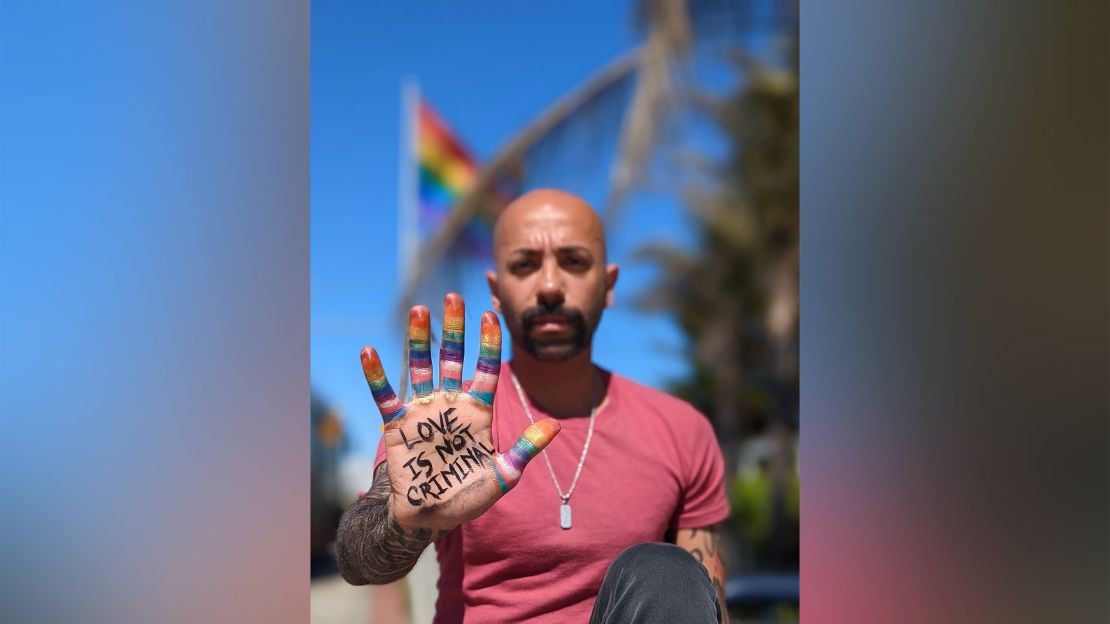
One night I called my mom. I told her I didn’t think I’d ever be coming home and told her why. It didn’t go well. That was the beginning of the end of our relationship.
She wanted to know if I was sick, if I’d gotten treatment. There are no resources for a Qatari LGBTQ parent to know what to say. Her reaction was to shame me and to remind me that I was doing this to the entire family.
We haven’t been in touch in years. A couple of my siblings heard, and we talked about it, but nobody wanted to process or accept it. Today, I don’t have a relationship with anybody in my family.
The day after I told my mom I decided to file for asylum. I moved to San Francisco in 2015 and have been here ever since.
You’ve been featured in media across the globe as an LGBTQ activist. What was the evolution of your activism?
I’ve met a lot of LGBTQ people in San Francisco, and my patients are disproportionately part of the LGBTQ community. It’s people like me that I’m taking care of. I see people from all over the world who’ve ended up in San Francisco with different stories and different journeys.
I began doing some volunteer work with an LGBTQ organization that was helping people in the Middle East escape dangerous situations. And then through that work, I got to learn about some of the gay people that were still living in Qatar.
Leading up to the World Cup this year, we heard about Qatari officials basically suggesting that there are no LGBTQ people in Qatar, that this is a Western thing. We needed to change this narrative.
Other people were trying to share anonymous stories, and I tried to talk to organizations myself, but we weren’t getting any momentum. The existing conversation was about whether gay fans were going to be OK during the 28 days of the tournament. They basically were ignoring that we exist, so I decided to come out publicly.
What sort of responses did you get?
I got hundreds of death threats from Qatari people within the first day. They found me on Instagram and were just flooding me with threats. But then other people from home started coming out to me. And so did other gay Qatari refugees who’d taken asylum in the UK, Canada and across the US.
I created a secure method electronically to meet some of them on Zoom, and I started hearing their stories. They were relieved to know they were not alone. I was the first one of us to say they weren’t.
Then I got the first message from someone who said they’d been tortured. They said they’d been kidnapped, kept underground for three weeks and beaten daily. And then I got another one, another one and another one. I heard about state-sponsored conversion therapy. I heard honor killing stories.
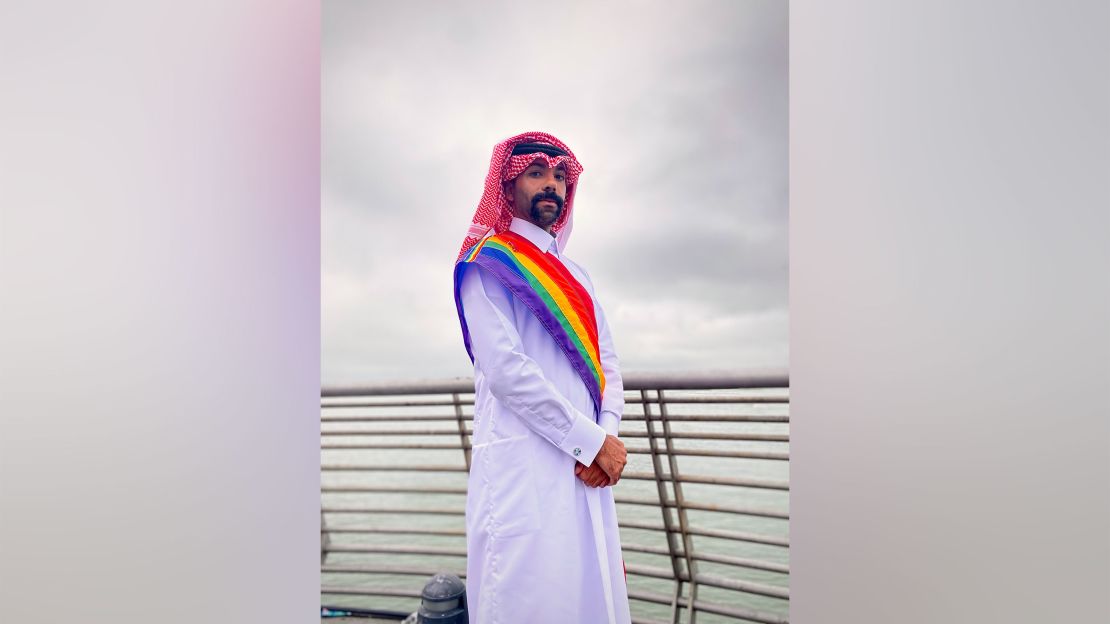
I reached out to Human Rights Watch and to journalists. People were like, “We’ve never heard of this before. We don’t know if it’s real.” So then I reached out to Outright International, which works to improve LGBTQ lives around the globe, to ask if there was an LGBTQ organization in the region to pick this up. “No,” I was told. “There is none.”
Meantime, I was in a media storm, being asked to tell my story on repeat – while I was hearing these other stories. I needed to find out what it was going to take for a human rights organization to publish a report. “Tell me what constitutes evidence. Tell me what I need to do,” I said to a researcher. She answered, “I must interview them myself.”
People were afraid of retaliation. They were talking to me because I’m one of them. I begged people to speak out. Eventually, I was able to connect enough of them to the researcher. The Human Rights Watch report, highlighting the abuses of LGBT people in Qatar, finally came out in late October.
But that’s not all you’ve done. Can you give a quick rundown on some of your other efforts?
I started a petition during Pride to tell FIFA and Qatar that love is not a crime. The letter demands, first, the safety of all LGBTQ people traveling to Qatar for the World Cup and, second, the repeal of laws that discriminate against LGBTQ Qataris so they can live in freedom. As of right now, the petition already has more than 82,000 signatures.
I also started a nonprofit, the Alwan Foundation, to advocate for LGBTQ people in the Middle East, with a focus on the Gulf region. It will do the sort of work I’ve been doing this year, but on a bigger scale and with professional help.
And earlier this month, I introduced the Proud Maroons, Qatar’s LGBTQ national football supporters’ group. The goal is to highlight the fact that global LGBTQ football fans are extended rights during the World Cup that local LGBTQ fans don’t have. The Proud Maroons, named after Qatar’s national football team (The Maroons), is the only LGBTQ supporter group that can’t openly participate at the World Cup because doing so would send its members to jail. I am asking LGBTQ fans and allies around the world to join our group to help raise awareness and our visibility.
What do you hope comes of all of this?
Initially, I wanted to come out and validate my own experience – and correct the narrative. I wanted to let people know that we exist and that our voices and our journeys matter. We need to be protected, too. Now people know that LGBTQ Qataris are not OK and asylum cases are not going to be denied. I feel good about that.
I hope that we continue to be seen after this year. I hope for a reality where we are not persecuted. I hope for a reality when we can be home.
I do not want Qatar to go back to being a black box after this World Cup – and for local retaliation to happen in the dark again. Who’s going to be helping us when the tournament is over and you’re all done partying?
